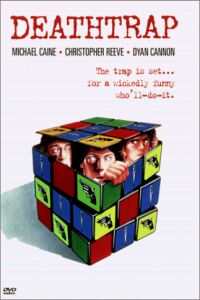
DEATHTRAP
US, 1982, 118 minutes, Colour.
Michael Caine, Christopher Reeve, Dyan Cannon, Irene Worth.
Directed by Sidney Lumet.
Deathtrap is a highly stylised film version of Ira Levin's very popular play. Levin has authored many novels, plays, screenplays including the comedy Hot Millions, Rosemary's Baby, The Stepford Wives, The Boys from Brazil. Here he is able to poke fun at Broadway, the writing of plays, the conventions of the whodunnit. By drawing attention to the devices and the theatricality he is able to use them excellently with suspense and comic effect. While the film is so artificial, audiences are able to accept this and move with it.
There are all kinds of surprises, discussions about how plays work, acting out of scenes. There are also some reversals of role - especially the romantic triangle with its homosexual emphasis. Michael Caine and Dyan Cannon are very good as the husband and wife. Christopher Reeve plays up to his Clark Kent image and then goes against the sociopathic playwright. There is excellent support from classical actress Irene Worth as a flamboyant Dutch psychic. The film is directed by Sidney Lumet who has directed many film versions of plays including works by Tennessee Williams, Chekhov, Eugene O'Neill, Arthur Miller, Peter Shaffer. Screenplay is by Jay Presson Allen who kept close to the play. She had collaborated with Lumet in Just Tell Me What You Want and Prince of the City. Sophisticated popular entertainment.
1. Deathtrap as a popular play? The work of the author and his interests? His novels and themes of artificiality and control? Power and death?
2. The theatricality of the film: the plot itself and its opening and ending with staged plays? Audience response to theatricality? Accepting the playwright and his wife, the discussion about play-writing, author's blocks, theorising, acting out to test the workings of the drama? The attempt at a perfect play about a perfect crime? The twists, the revelations, complexity of motivations? The ironic ending? Audiences being distanced from what is put before them yet becoming closer by observing the artifice? Audiences enjoying the plot and the ironic comments on theatre, human behaviour?
3. The restricted sets: theatre, the bar, Sidney Bruehl's home? The decor and setting of Sidney's home : upstairs, downstairs? The weapons? The opening up of the play for some exteriors: the opening and the streets, the train, the station, Sidney meeting Clifford at the station? The weather - with its theatrical lightning etc.?
4. The stars and their popular appeal? Their acting styles and going against image? The loud and contrived acting styles? The breaking through of conventions - especially with the romantic triangle?
5. Audience liking of the popular murder mystery, the one-set, five-character play? The puzzle, the motives?
6. The humour of the screenplay - the popular dialogue, theatrical and murder mystery references, jokes? Flip dialogue?
7. The triangle and the irony of the gay relationship? Sidney's mocking of homosexual relationships and the irony of his own inclination? The parallel with the heterosexual relationship? Love, jealousy, power and control? Audience response - approving, disapproving? The parallel of Sidney's relationship with his wife with that to Clifford? Love, hating, killing?
8. Michael Caine's portrait of Sidney? The failure of the play, his alcoholic response, coming home to Myra, the arguments, seeming to pander to her? The puzzle about Cliff, his ambiguous memories of his identity, the play, his extolling it, the invitation for Cliff to come, letting Myra know about the plans for murder? His arrival, the discussions, Houdini's handcuffs, the build-up to the sudden murder? His ease in killing Clifford? Clifford's being the victim? Myra's standing by?
9. Myra and her attempts at support, her illness, heart, worry about Sidney, her horror at the murder plan. her trying to put it off? Clifford's death. burial? Her anxiety? Fears in the house at night? Her telling Sidney that she was partly exhilarated by the murder? Clifford's attack, her fright, death, funeral? The irony of her leaving so much money to Sidney? Dyan Cannon's sketch of the neurotic wife?
10. Audience response to Sidney when they knew the truth? Cliff's reappearance and the relationship with Sidney? Cliff's simple style on arrival, adulation of the famous playwright? The enactment of his death? His gradual control of Cliff? Typing, wanting the lawyer to notice his locking the drawer? Helga and her ominous remarks? Sidney's being influenced by Helga? Wanting to counteract her? The truth about the play, his discovery of what Cliff was doing? His devices for spying on Cliff? The clash, the giving in to Cliff? His wanting to gain control over Cliff? Acting out the murder business? Cliff controlling him? The Houdini handcuffs? The final fight in darkness, thunder and lightning? Sidney's death? The irony of his failure in getting his hit play?
11. Cliff and the transition from naivety to sociopath? His brutality with Myra? His enjoying killing her? The homosexual relationship? His typing the play, concealing it? Playing cat-and-mouse with Sidney? The psychotic control? The explanation of making a success of the play, putting Sidney in a compromising position, having control over him? His outmanoeuvring Sidney with wit? The acting out of the murder action and his controlling Sidney? The reversal of roles and Sidney's wounding him? His death?
12. Helga and the performance by Irene Worth? The Dutch psychic? The mockery of her personality and style? Her Dutch characteristics? Her being a celebrity? Her acting out of the sense of ominous suffering? Her second visit? The candles? Warning Sidney? The fight to the death? The irony of the ending and her succeeding with Deathtrap?
13. The irony of motives and the counterpointing of motives? Observation of human nature in such contrived situations and settings? Insight through the theatrical experience?